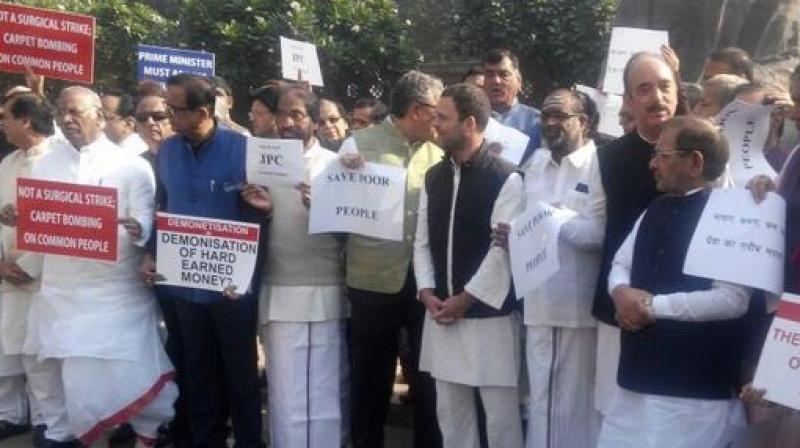Battle For State Begins Feb 11 With Notes Ban As The Big Theme
 NEW DELHI : Uttar Pradesh, seen as the main determinant of who will be India’s next Prime Minister, will vote on seven days, starting February 4 and ending March 8. Like four other states including Punjab, the results for India’s most-populous state will be declared on March 11, the Election Commission announced today.
NEW DELHI : Uttar Pradesh, seen as the main determinant of who will be India’s next Prime Minister, will vote on seven days, starting February 4 and ending March 8. Like four other states including Punjab, the results for India’s most-populous state will be declared on March 11, the Election Commission announced today.
Uttar Pradesh, which has 403 seats and 200 million people, will test Prime Minister Narendra Modi’s popularity after he abruptly pulled 86% of the currency in use in a demonetisation drive that he believes will check black money and tax evasion.
At a rally on Monday in the state capital of Lucknow, PM Modi said he was stunned by the size of the audience – “this is the largest rally I have ever seen” he professed – and emphasised that his government has introduced new financial schemes to benefit small traders, businessmen and farmers, believed to be worst hit by the notes ban.
Claiming a “positive undercurrent” for the BJP after the notes ban, party spokesperson GVL Narasimha Rao said, “the fight against corruption and demonetisation will be the main theme of the elections.”
Yes, it will, agreed the Congress, which said it will highlight the cash crunch that encompassed the country after 500- and 1,000-rupee notes were cancelled at a few hours’ notice. “The notes ban has caused the maximum pain to each of the 125 crore Indians,” said party spokesperson Manish Tewari.
Uttar Pradesh is governed by the Samajwadi Party, whose founding family is entangled in a colossal and high-volume battle for power. Patriarch Mulayam Singh, 77, wants to remain in control of the party with his close aide and younger brother Shivpal Yadav.
They are facing off against Mulayam Singh’s son, Chief Minister Akhilesh Yadav and his mentor, Ram Gopal Yadav, who is a cousin of Mulayam Singh’s. The competing factions – Akhilesh Yadav’s is by far much larger – have indicated that despite the obvious damage that would be wreaked, reconciliation is out-of-bounds.
“There is no agreement,” said Ram Gopal Yadav today, referring to a two-hour-long meeting yesterday between Akhilesh Yadav and his father that discussed the parameters of a possible truce without resolution. Both sides have claimed rights to the Samajwadi Party symbol of the cycle, which has easy and long-standing recall among Uttar Pradesh’s voters.
The Election Commission today confirmed that it is reviewing the case to decide who will own the symbol; it could also decide neither side will be entitled to use it for now.The Congress, much depleted after a series of electoral losses, could form an alliance with Akhilesh Yadav if he proceeds to form his own party.
The Samajwadi contortions have included the expulsion, quickly revoked of Akhilesh Yadav from the outfit by his father, and angry public recriminations from both sides blaming the other endangering the future of the party.
A potential gainer – apart from the BJP, which has not governed Uttar Pradesh for 14 years – is Mayawati, the 60-year-old Dalit icon who has served four times as Chief Minister. Muslims, who form 19 per cent of the state’s population, have traditionally been loyal to the Samajwadi Party; she is now working to win them over to her Bahujan Samaj Party and has allotted the most seats to Muslim candidates.
PM Modi’s Bharatiya Janata Party (BJP) swept Uttar Pradesh, in the 2014 general election, handing him the biggest parliamentary majority in three decades. A repeat of that success would help the BJP wrest control of the Rajya Sabha or parliament’s Upper House, making it easier than it has been to pass key reforms.
Mayawati is calling on minority groups like the Dalits – 22% of the population – and Muslims to reject the BJP and its commitment to Hindu nationalism. Some lower caste voters deserted her BSP in 2014, allowing the BJP to win 71 out of 80 seats. But a series of attacks on Dalits this year including by self-styled Hindi cow vigilantes, has re-energised her.
In July last year, footage emerged of four Dalits tied to a car, stripped and being flogged in PM Modi’s home state of Gujarat, triggering violent protests. Like other opposition leaders, Mayawati sped across the country to appear at the side of victims.
Aware that Mayawati is emerging as the main opponent to PM Modi in Uttar Pradesh, BJP chief Amit Shah has made more than 150 visits to the state in the last two years to expand the BJP’s appeal from its traditional base of prosperous and upper caste voters to less privileged voters.ndtv.

